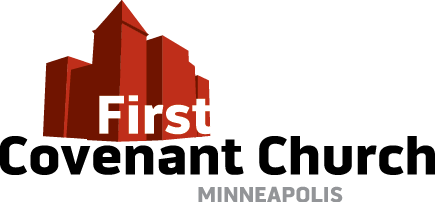First Covenant Church Minneapolis, MN
How we live together well and what it means to “love all”
As First Covenant has been reimagined over the past decade, lay leadership and staff have developed a consistent discipline of listening to the congregation on matters of church direction and decision making. There is a pattern of meeting to listen and discern, to reflect and discuss (sometimes loudly, with passion), to refine and offer feedback. This statement is our best attempt to articulate the conversations we have had as members of our congregation have listened to each other, reflected on scripture and lived together in community. This is where we find ourselves now. We continue to live and grow as a Christian community rooted in the Covenant tradition, and this living document may change shape again over time.
We affirm broad historical orthodoxy as outlined in Christianity’s Apostles’ Creed and Nicene Creeds. We refuse to allow theological differences to divide a community, while at the same time advocating for the marginalized. We believe that the beauty of the body of Christ comes from our shared faith in Christ, not from total agreement about every matter.
We are rooted in our core values and the love of Christ, and we believe our differences and diversity will deepen and enrich our spiritual life together.
We are unified by our belief in Jesus Christ’s redeeming and restorative love, and we desire to share God’s love with all people. (Galatians 3:28, Matthew 28: 18-20) The Bible informs our belief and guides our ministry and community. The Word of God is active, living and dynamic because God is in us. Personal experiences with God, and the historic and emerging teachings of the Church help inform the application of scripture to present day life. (Hebrews 4:12).
We believe that faithful people can and will come to different conclusions about the meaning of scripture. We believe that this church can include these different understandings within its life as it lives out its mission. We welcome diversity of theological views and scripture interpretations. Rooted in Scriptures’ wisdom traditions, we value mystery over certainty, and practice deferring to the guidance of the Holy Spirit in all areas of our lives.
As a community, we seek to be known as people who:
Love God, the creator and source of love. (I John 4:7-11)
Love self as the beloved creation of God. (John 15:9-17)
Love all people unconditionally, whether or not we agree on practical matters. (Matthew 22:37-40; John 13:34)
Live in freedom and love others freely (John 8:31-32; 2 Corinthians 3:17; Galatians 5:13)
Respect others without judgement and hold safe space for each person to journey authentically with God.
Don’t fear difference; instead, we welcome new people as guests and equals. (Matthew 7:1-5)
Practice mercy, compassion, and justice. Advocate for and relieve the oppression of the marginalized. (James 1:27)
Are generous, giving in various ways to those in need.
Live into the vision of the “healing block” as a place of hope and healing for our broader community.
Welcome activities to our facility that will encourage and enable our members, attenders and the wider community to thrive.
Promote spiritual growth for individuals and the church community; Disciples of Christ living transformed lives, humbly acknowledge our brokenness, accountable to each other and to God. (Romans 12:1, 10-16; Galatians 5:22-23)
Work as one body made up of multiple parts with equally important functions. All people and their gifts are needed to fully embody the infinite Creator as best we can. God uses many different people/things/situations—both obvious and unexpected—to reveal God’s truth, love and wisdom, and to accomplish the work God has prepared for us to do. (I Corinthians 12:12-31; Ephesians 4:1-16)
Welcome all persons and families, including LGBTQ+, to participate at all levels of community: serving in ministry, joining as members, holding staff and leadership roles.
Offer full pastoral care to all in our congregation without regard for ability, race, sex, gender identity or sexual orientation. Pastoral care includes (but is not limited to) spiritual counsel, prayer, baptism, weddings, funerals, and visitation during illness.
